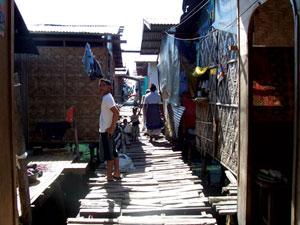How are you going to address illegal logging in Paquibato District?
GARCIA: Again, that’s a police matter. That�s a problem best resolved by the city officials.

A slum area in Sasa. (davaotoday.com photo by Grace Uddin)
DUREZA: We have been trying to address this problem for a long time. I think it�s the DENR�s job to stop and arrest these illegal logging operators. If they don’t have the capacity to do that, we can create a joint task force composed of the military, police and DENR personnel. We should set up a checkpoint in strategic upland areas. We should have pro-active programs. For example, we should have a law regulating the possession of chainsaws to arrest illegal logging. Someone should have a permit to own one.
APORTADERA: As a congressman, I will have to review laws on illegal logging. It should not be for the congressman but for the law enforcement to stop illegal logging activities. The implementation of illegal logging laws is the responsibility of the police. But do we have sufficient penal laws? Is it easy to prosecute them? One of my expertise in law is criminal law so I think I can help. If DENR or the police would need additional budget, as Congressman I should be able to add more funds in law enforcement.
BATUCAN: Illegal loggers should be given jobs. Government and landowners should implement reforestation program where illegal loggers can earn income.
How are you going to address the housing problems in Parola, Sasa and Bunawan?
GARCIA: Mayor Duterte has already offered to provide a resettlement site for the residents in Parola. But some time last year, there was a problem with DMC and they were relocated in Mahayag. They were sponsored by the Gawad Kalinga. So, Dr. Cunanan came to me and asked me if I could be of help, so I extend help through my PDAF. I gave one million, to subsidize the cost of 40 or 35 houses. In Cabantian, in 1992, there were only a few people but after the road was opened — because that is the barometer: once you open the road, provided electricity that’s the time that villagers will start coming in. Now from 1992 up to now, we cemented plenty of roads, even the city have cemented plenty of roads too. We put up electricity and you can see many entered all the way even up to Acacia, there are villages, resettlement areas. So as long as you can give the basic needs water, electricity, the people will pour in. In terms of housing program, we got a fund from NHA and sponsored to Indangan, the one in ADAP, the Association of Differently Abled Persons, we helped them in acquiring their property. According to the people the annex high school building helps them because they had a hard time sending their children to school all the way from Cabantian or Tibungco or Bunawan so we are trying to arrange to comply with the requirements.
DUREZA: We already have the Davao Shelter Code in the city. In the Moro village in Sasa, majority of the people live near the sea while others live along the side of the roads. We want to address this problem of housing. We will give them relocation. Their condition is very hard.
APORTADERA: In 2001, I was hoping that the incumbent congressman can address the problem in Parola. There was a proposal for a medium-rise housing. As much as possible, we should not move the settlers away from their means of livelihood in the area. But we have to put them in a habitable place. But we don�t have enough space, so we were thinking of a medium-rise or a condominium type of housing, only about three stories high. We talked about this plan, which was reasonable, but there was no response. We discussed it with the residence of Parola. I won in Parola but I did not make it to the congressional race in the district. I was independent. I had no party to speak of. I hope the people now are ready for change. A congressional agenda in District Two should be to pursue this medium- rise concept of housing.
BATUCAN: If they lack a place to settle in, I will promote a rent-to-own (housing) program.
2007 Elections









